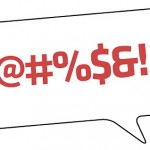The right to be offensive
Workplace humour has a dark side.
“I disapprove of what you say, but I will defend to the death your right to say it.” Voltaire
I found myself the other evening at the heart of a heated dinner debate and somewhat surprisingly not in the majority camp either. The issue: the right to be humorous, even if it causes offence and what this means for the undermining of freedom of speech by overly political correctness. Should we be able to say what we like, when if it’s supposed to be funny?
It was a long dinner!
The discussion started around a remark made by a British comedian, Frankie Boyle, who made what he believed presumably to be a joke about a disabled boy. There was some negative media commentary afterwards and the mother, a minor and truthfully publicity seeking, headline grabbing, British celebrity, thereafter made a documentary about handicapped children.
Orwellian newspeak
Humour in any organisation is a vital ingredient to creating a successful working atmosphere, so I am not suggesting a move towards the 1984 diminishing vocabulary of ‘Newspeak’, the politically correct language in Orwell’s famous dystopia. But stereotypes and prejudice do die hard. If we create a comedic culture where it is acceptable to use “jokes” about vulnerable people, then for me this marks the crossing of a very distinct line and sets the scene for the validation of copy cat behaviour.
Humour
There is no doubt that different groups have been singled out and targeted over history in jokes by more powerful and dominant sectors of our society, based on: gender, race, religion, physiology, nationality to name but a few. I understand that eliminating this type of behaviour in our media is not necessarily going to eradicate it from our societies. A culture of formal disapproval has been created around certain “isms” ( e.g. racism, sexism, anti- Semitism) which are now illegal, which we saw with John Galliano and his anti-Semitic rant earlier this year, or Mel Gibson’s racist tirade.
Causing offence
It’s hardly surprising that if in our wider cultures, offensive humour goes unchecked, that it sets the tone in our workplaces, when disrespectful comments, cloaked as jokes are on the increase, along with other forms of verbal abuse. We tend to think of this behaviour as shouting and /or profanity, but it also comes in more subtle, lower key, but equally damaging forms.
Humour is one of them.
According to U.S. Legal Definitions site, the definition is: “Verbal abuse is the use of words to cause harm to the person being spoken to. It is difficult to define and may take many forms. Similarly, the harm caused is often difficult to measure. The most commonly understood form is name-calling. Verbal abuse may consist of shouting, insulting, intimidating, threatening, shaming, demeaning, or derogatory language, among other forms of communication.”
Ill-disguised malice
Humour (the quality of being amusing) can very often simply be ill disguised malice. I coached an entry-level employee recently whose boss referred to him within the department as his “monkey”. Another contact left a job because of the constant jokes made about her figure. Another changed organisations because of incessant teasing about his red hair, which he now colours blond to avoid the jokes and name calling. (A teacher friend subsequently mentioned that red heads are considered a number one bullying target in schools). Read: Do redheads need be a protected minority? I have coached clients who have been the butt of jokes about their regional accents, clothes, hobbies and vision (or lack thereof.)
Much of this behaviour if allowed to continue in a working environment, can be profoundly damaging and develop into a form of bullying, which should be dealt with as such. It is of course difficult to measure and very subjective. What can be offensive to one person, may be glossed over and considered hilariously funny by another. How do we benchmark sensitivity? But disrespectful behaviour has been identified as costing as much as $300 billion
Political correctness
This is not to suggest that communication and language be sanitized to a monotonous neutrality, where fun is taken out of the workplace. Nor should we live in constant fear of offending people and getting caught up in the complex maze of political correctness. Should we be allowed to call a man with no hair, bald, the use of the word manhole, rather than maintenance portal, comes with a reprimand. Hailing from the North of England my directness has not gone unnoticed, even when I believe I am exercising great restraint! I suspect would find myself in even more trouble.
I rejoice in the fact that I live in countries where freedom of speech is embraced. But neither am I convinced that
” A people which is able to say everything becomes able to do everything.” Napoleon I.
It is also about how we say things.
If your organisation has a bullying or toxic culture and you want to deal with it – get in touch NOW!





Yes, humour can very easily be a disguise for bullying! Says victim of blonde jokes….
Jane
Hi Jane – thanks for your comment. Blondes are the target for many jokes but I believe they earn more than brunettes – so you have the last laugh!
Oh how I agree with you. I suffered a year of misery in my first year at college. My accent and my appearance (I’ve never been a slender creature) were treated as a source of fun by a “friend” in my group”. She was very witty and her comments were very funny. But my word did they hurt. Now looking back I realize it was bullying!
HI Wendy – yes there are many ways to be cruel and jokes can be one of them for sure.
I think humour is a very powerful way of social control. It has been found that stereotypes only work when thrown downwards (in the status ladder) and not so much upwards (except in homogenous groups that exclude those targeted). Just what “works” and doesn’t work in humour shows us the role of power in defining what we can laugh at and what we can’t.
HI Victoria – I think that is certainly true and different groups become ” targets” based on fashion or power playing. My hair is somewhat lighter now than it used to be but growing up I have to say, I never exprieneced any sort of teasing or jokes about having red hair. A an auburn connection of mine shaves his head to avoid teasing another dies his hair blond as I said in my post. Sad!
My rule of thumb about humour is only to joke about things people can change – their behaviour, their attitudes and not to joke about things they can’t change such as their hair or skin colour, their weight (I know they can in theory but I put weight on my don’t joke about list).
So I will make jokes about someone doing something crass, but not about particular groups.
Whilst I do know I have the right to free speech, constrained by UK laws on harassment, slander and a few other things, I believe that manners come into it somewhere and I do not believe I have an unfettered right to make people feel uncomfortable. I am sure I do from time to time by mistake but it is not my policy to do so.
I do laugh about stereotypical jokes with people from the corresponding group who make those jokes. For example if I am with a jewish person who tells jewish jokes (and they are the funniest of all) that’s OK, but I wouldn’t initiate such jokes. I have heard fabulous disabled comedians joke about being disabled, but I wouldn’t go there since thankfully I am not. I do tell blond jokes (sometimes) for obvious reasons.
In the workplace humour is often used as a weapon to exclude or belittle someone behind the mantra of “I was only joking” and this has no place in the workplace, though it occurs frequently. There is something here about making oneself feel better by puttting someone else down that makes me feel uncomfortable and I tend to avoid comedy based on that and do not enjoy it.
Perhaps I am lost in the world of PC or perhaps real humour doesn’t rest on cruelty?
Annabel – great rules – or possibly great thumbs. Clearly if Irish people, blondes, myopic or any other potentially targettable group start cracking jokes about themselves – then that is OK. But there is a fine line and it can be and is often crossed in the workplace. The right to free speech carries certain responsibilities.
Hi Dorthy, Hi Annabel great stuff! But I think there are risks even round these careful rules. Sometimes overweight people makes jokes about their weight because they know it is expected and it can be a way of being accepted. And I think this can be true of other groups. Have you heard Lenny Henry talk about the jokes he told in his early career and how it makes him feel now to look back. I hear some women comedians doing the same thing now when they perform in front of a mixed audience! One day I hope things will change and each of us can poke fun at ourselves without the fear that for someone out there we are just reinforcing a stereotype!
Hi Wendy thanks for your comment – do you think then that we are moving into too much political correctness if people can’t poke fun at themselves?. There is a reason for stereoptyping after all – do you not think that some of it can be true?
Hi Dorothy – that is an interesting question.
Living in a family of mixed cultures means dealing with pre-conceptions on a daily basis. Stereotypes help us deal with a complex world – we have to group and classify to deal with that complexity. But, my own experience suggests what might be true about a stereotype is far out-weighed by everything else.
For me, I don’t think it is so much about wanting to be politically correct as about wanting not to hurt or to be pre-judged. I think poking fun at your self is fine if you can do it because you want those who wish you well to enjoy the joke. I think it becomes something quite other when you do it to entertain those who probably wouldn’t like you otherwise.
Wendy, I couldn’t agree more. Sometimes people make jokes about themselves in order to show others that they can be like them, despite having X characteristic, so it’s really the same process as someone who doesn’t have it.
I would also warn against making jokes about types of people you believe are not there. I can’t count the number of times I’ve heard antifeminist or homophobic jokes before people knew I qualified. And those are a warning against coming out or expressing your views, or acting in a certain way and extremely detrimental to the work environment. And even if you don’t qualify, you know you are in a judgemental environment that could readily turn against you.